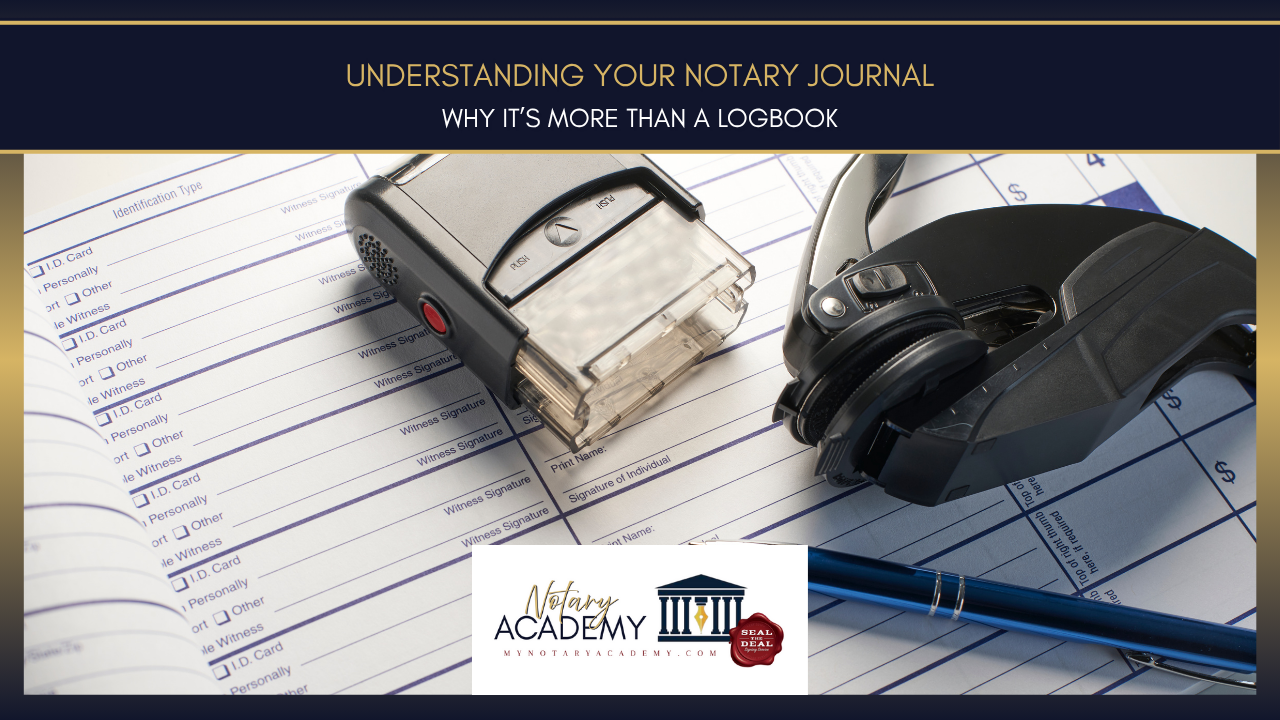Understanding Your Notary Journal: Why It’s More Than a Logbook

Understanding Your Notary Journal: Why It’s More Than a Logbook
It’s your best defense, your backup, and your receipt — treat it like gold.
New notaries often treat the notary journal like a boring formality. Old-school notaries might skip it altogether if their state doesn’t require one.
Your notary journal is the single most important document in your entire business.
Whether required by law or not, it protects your signer, your business, and you. Let’s break down why it matters — and how to use it like a pro.
What Is a Notary Journal?
A notary journal is a written or electronic record of every notarial act you perform.
It includes key info like:
Date & time of notarization
Type of notarial act (acknowledgment, jurat, etc.)
Document type
Signer’s full name & signature
Type of ID presented
Thumbprint (when required)
Fees charged
Notes or observations
Think of it as your transaction receipt and liability shield.
Why Is It So Important?
Even if your state doesn’t require a journal (hello, Florida), here’s why you should use one anyway:
✅ 1. It protects you legally.
If a document you notarized gets disputed — or worse, shows up in a fraud case — your journal may be the only proof that you followed proper procedure.
✅ 2. It refreshes your memory.
If you're asked to testify about a notarization from 18 months ago, are you going to remember it? Nope. But your journal will.
✅ 3. It shows you’re a professional.
Keeping a journal shows that you take your job seriously and follow best practices, even when the law doesn’t force your hand.
✅ 4. It builds trust.
When signers see you logging the notarization, it gives them confidence that you're legit. (Bonus: scammers tend to back off when they realize you’re documenting everything.)
What Should Go in Your Journal (Every Time)
Field / *Why It Matters
Date &Time *Proves when the notarization happened
Signer’s Name *Identifies the party involved
Document Type *Provides context for the act
Type of Notarial Act *Clarifies what you performed
ID Info / Credible Witnesses *Verifies you followed proper ID procedure
Signer’s Signature *Confirms they were present and consenting
Thumbprint (if required) *Adds fraud protection for sensitive documents
Notes *Catch-all for anything unusual (refusals, issues)
Pro Tip: Never leave a journal entry half-complete. If the signer refuses to proceed, note it.
Common Mistakes to Avoid
Leaving blank lines (they can be filled in later — not by you!)
Not logging general notary work
Sharing one journal with multiple notaries
Letting clients take a photo of your journal
Using shorthand or skipping document names
Your journal should be clear, complete, and secure.
How to Keep It Safe
Lock it up when not in use
Never leave it in your car unattended
Use one journal per notary (even if you run a team)
Keep journals for as long as your state requires - or longer, just to be safe
If your journal is ever lost or stolen? Report it immediately to your Secretary of State (if required) and document everything.
At Notary Academy, We Don’t Skip the Details
We train notaries to build habits that protect their careers - starting with their journal. It’s not just a logbook. It’s your lifeline in a legal world. If it’s not written down, it didn’t happen, and we’ll make sure you never forget that.
